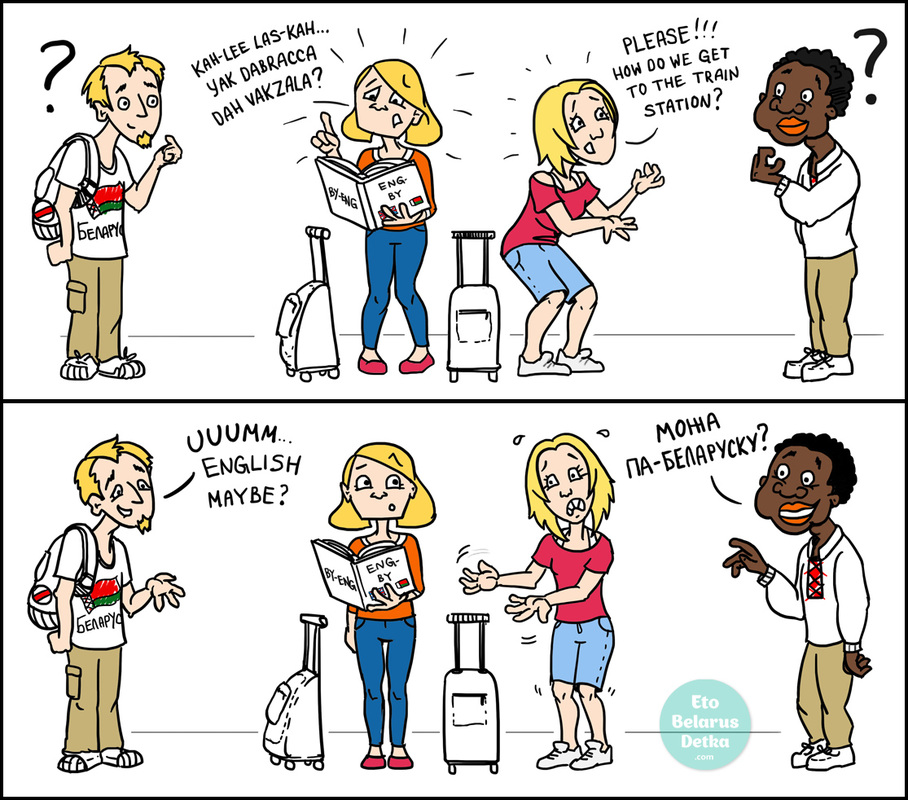The language situation is definitely one of the bigger mysteries of Belarus. To a foreigner the Belarusian language may appear to be a hermit, as the majority of Belarusians use Russian (not Belarusian) in their daily communication. But don’t judge too quickly as there are some good reasons for this, especially when looking into the Belarusian history.
Some facts about the Belarusian language:
1. Belarusian is a Slavic language, distinct from Russian and Polish, which are its close relatives. Another close relative of Belarusian language is Ukrainian with whom it shares 84% of common vocabulary. Belarusians are generally able to understand Ukrainian.
2. Belarusian has been the official language of Belarus only since 1918. However its roots go way back, as it is believed that Belarusian was the official language in the Grand Duchy of Lithuania (the largest European state from the fourteenth to sixteenth century, included parts of present day Belarus, Lithuania and Latvia, Ukraine, Poland and even Russia). After this period the Belarusian language has been spoken and used sporadically mainly by certain intellectual groups and in the countryside, but
3. never has it been a language spoken by the majority of Belarusians.
One of the main reasons for this is because Belarus has been occupied by Poland and Russia (think Tsar period and the Soviet Union) and these states forced their own languages onto the calm and accepting Belarusians.
While Belarusian is studied at most public schools, and the majority of people understand Belarusian perfectly, there’s really no place to use it in the vastly “Russified” outside life, so the language gets forgotten. This means that even if locals wished to speak Belarusian in public – it probably would not come out perfect right away, without some practice. There is even a word for a Belarusian-Russian mix – “Trasyanka,” – where words you don’t know in Belarusian you replace with Russian ones, and it’s anything but cool to speak Trasyanka.
Nevertheless, the current situation of the Belarusian language is a promising one: if even 10 years ago, Belarusian-speakers were considered to be either opposition or “people from the village”, or just really strange people, outcasts (all very unpopular social roles) – now, the language is more and more associated with a cultural revival, a rebirth of the Belarusian identity, supported by the state. The desire to speak Belarusian has grown greatly among the youth; many are even ashamed they do not speak it. More and more private cultural revival initiatives are born, offering Belarusian language classes that are becoming very popular among Belarusian youth.
Belarusian language is now used widely on street/info signage and public transportation (despite some funny situations involving “Lacinka”, a Latin script for rendering Cyrillic Belarusian: the infamous YouTube video, where an unprepared foreigner attempts to pronounce the names of Minsk’s metro stations written in Lacinka, and fails miserably).
Speaking Belarusian is important for the Belarusian identity and many acknowledge this fact, however it is also a struggle since the Russian language is deeply embedded in the culture and mentality of most Belarusians. Nevertheless, it’s very important to keep the language alive and who if not Belarusian are able to do this, Eto Belarus Detka!
Some facts about the Belarusian language:
1. Belarusian is a Slavic language, distinct from Russian and Polish, which are its close relatives. Another close relative of Belarusian language is Ukrainian with whom it shares 84% of common vocabulary. Belarusians are generally able to understand Ukrainian.
2. Belarusian has been the official language of Belarus only since 1918. However its roots go way back, as it is believed that Belarusian was the official language in the Grand Duchy of Lithuania (the largest European state from the fourteenth to sixteenth century, included parts of present day Belarus, Lithuania and Latvia, Ukraine, Poland and even Russia). After this period the Belarusian language has been spoken and used sporadically mainly by certain intellectual groups and in the countryside, but
3. never has it been a language spoken by the majority of Belarusians.
One of the main reasons for this is because Belarus has been occupied by Poland and Russia (think Tsar period and the Soviet Union) and these states forced their own languages onto the calm and accepting Belarusians.
While Belarusian is studied at most public schools, and the majority of people understand Belarusian perfectly, there’s really no place to use it in the vastly “Russified” outside life, so the language gets forgotten. This means that even if locals wished to speak Belarusian in public – it probably would not come out perfect right away, without some practice. There is even a word for a Belarusian-Russian mix – “Trasyanka,” – where words you don’t know in Belarusian you replace with Russian ones, and it’s anything but cool to speak Trasyanka.
Nevertheless, the current situation of the Belarusian language is a promising one: if even 10 years ago, Belarusian-speakers were considered to be either opposition or “people from the village”, or just really strange people, outcasts (all very unpopular social roles) – now, the language is more and more associated with a cultural revival, a rebirth of the Belarusian identity, supported by the state. The desire to speak Belarusian has grown greatly among the youth; many are even ashamed they do not speak it. More and more private cultural revival initiatives are born, offering Belarusian language classes that are becoming very popular among Belarusian youth.
Belarusian language is now used widely on street/info signage and public transportation (despite some funny situations involving “Lacinka”, a Latin script for rendering Cyrillic Belarusian: the infamous YouTube video, where an unprepared foreigner attempts to pronounce the names of Minsk’s metro stations written in Lacinka, and fails miserably).
Speaking Belarusian is important for the Belarusian identity and many acknowledge this fact, however it is also a struggle since the Russian language is deeply embedded in the culture and mentality of most Belarusians. Nevertheless, it’s very important to keep the language alive and who if not Belarusian are able to do this, Eto Belarus Detka!
What is your opinion on the current (or past!) situation involving the Belarusian language? Where is it going? How should it be ideally? Please, share your thoughts!
Read more about Belarus on our newest platform HiFive Belarus!
Read more about Belarus on our newest platform HiFive Belarus!






 RSS Feed
RSS Feed
